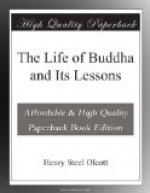The history of Sakya Muni’s life is the strongest bulwark of his religion. As long as the human heart is capable of being touched by tales of heroic self-sacrifice, accompanied by purity and celestial benevolence of motive, it will cherish his memory. Why should I go into the particulars of that noble life? You will remember that he was the son of the king of Kapilavastu—a mighty sovereign whose opulence enabled him to give the heir of his house every luxury that a voluptuous imagination could desire: and that the future Buddha was not allowed even to know, much less observe, the miseries of ordinary existence. How beautifully Edwin Arnold has painted for us in The Light of Asia the luxury and languor of that Indian Court, “where love was gaoler and delights its bars”. We are told that:
The king commanded that within
those walls
No mention should
be made of age or death
Sorrow or pain, or sickness
...
And every dawn
the dying rose was plucked,
The dead leaves hid, all evil
sights removed:
For said the king,
“If he shall pass his youth
Far from such things as move
to wistfulness
And brooding on
the empty eggs of thought,
The shadow of this fate, too
vast for man,
May fade, belike,
and I shall see him grow
To that great stature of fair
sovereignty,
When he shall
rule all lands—if he will rule—
The king of kings and glory
of his time.”
You know how vain were all the precautions taken by the father to prevent the fulfilment of the prophecy that his beloved son would be the coming Buddha. Though all suggestions of death were banished from the royal palace, though the city was bedecked with flowers and gay flags, and every painful object removed from sight when the young Prince Siddartha visited it, yet the decrees of destiny were not to be baffled, the “voices of the spirits,” the “wandering winds” and the devas, whispered the truth of human sorrows into his listening ear, and when the appointed hour arrived, the Suddha Devas threw the spell of slumber over the household, steeped in profound




